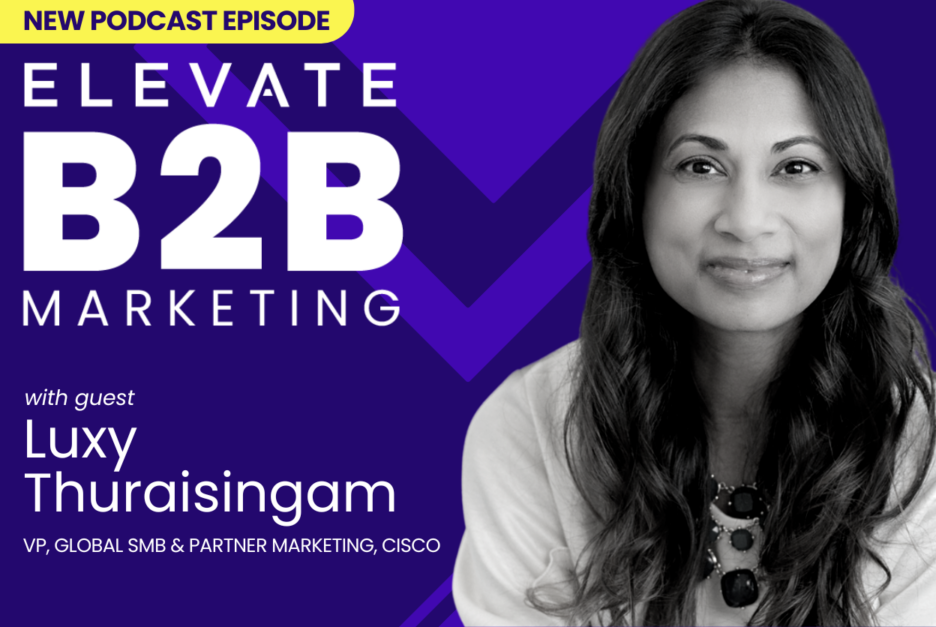What can B2B marketers find at the intersection of strategy and authenticity in 2023, when both elements are playing greater roles than ever?
Luxy Thuraisingam, vice president of global SMB and partner marketing at Cisco, knows the importance of both strategy and authenticity in B2B marketing — and how together they act as a force multiplier greater than the sum of their parts.
Luxy has a passion for catalyzing new thinking in B2B marketing, and for the newest episode of our Elevate B2B Marketing Podcast, she sat down with our CEO Lee Odden to explore the combined power of authenticity and a strategic mindset.
The Elevate B2B Marketing Podcast features unique conversations that inform and inspire some of the world’s leading B2B marketers, and each episode digs deep with conversations between Lee and top industry voices, who are creating impact and inspiring the world of B2B marketing.
In this interview, Luxy shared her insights on many of today’s key issues B2B brands are facing today, including:
- Creating an environment that’s inclusive and supportive to all perspectives, where we can be safe and authentic
- Following your professional and personal passions
- Showing tangible impact on how you’re driving business
- Leaving your organizational ego and your organization silos behind
- How brands are authentically helping communities, investing in sustainability, and focusing on diversity and leadership
You’ll find the full interview podcast here, and you can also listen on your favorite podcast platforms including Spotify, Apple Podcasts, and Libsyn:
Check out the full video of Luxy’s conversation with Lee here:
Be sure to also subscribe to the Elevate B2B Marketing Podcast to stay up-to-date as each new episode premiers.
B2B Marketing Insights From Luxy Thuraisingam
Let’s also look at some of the highlights of Luxy’s insightful podcast episode.
What are you most excited about in your current role at Cisco as vice president of global SMB and partner marketing?
Luxy: I am so fortunate, and it’s been just over four years and I’m just still really happy and excited to be here. It is such an amazing organization, and it’s also amazing when one finds themselves in an organization that truly is aligned to your personal values. And that’s what I find — Cisco stands up on all things from purpose to social justice. It’s so close to what is important to me at this stage of my life, and then the people — I get to work with some of the smartest customers, partners, and, leaders who are really respected in the organization. There’s a reason that three years in a row we are the number one best place to work according to Fortune’s list. The work I and my team get to do has real impact on the organization.
What is the importance of strategic mindset for marketing leaders?
Luxy: I think being strategic to me is in my DNA, and I don’t think it’s limited to marketing leaders. I think every leader in every industry needs to be strategic, as individuals who can connect the dots, and see the ripple in the ocean and know how that’s going to impact the bigger ecosystem and the bigger company in the future.
Something that I take pride in is the ability to go from a strategic idea and then being able to influence others so we can take pragmatic action. Because a strategic idea is just an idea until you can execute on it. At the end of the day, our environment is changing. It’s changing so fast, and we cannot be comfortable with what we are doing today. We have to innovate, we have to be agile, and we have to look for new solutions for problems that probably don’t even exist right now.
What do you do as a leader in your organization to create a great environment for your marketing team?
“Leadership is always a hundred percent work in progress. Start with is what kind of environment do you want to work in. What kind of environment do you thrive in? Use that as the goalpost to lead by example.” — Luxy Thuraisingam @Luxythu Click To TweetLuxy: Leadership is a hundred percent work in progress, and I’m still learning every day how to create that environment, because it is personally really important to me. Start with is what kind of environment do you want to work in. What kind of environment do you thrive in? Use that as the goalpost to lead by example. For me that means being an environment that’s inclusive and supportive to all perspectives. It’s an environment where we can be safe and authentic. My team and I celebrate our wins. We take a lot of pride and we actually equally celebrate our fails because those are learning moments. It’s also a place where we could do more than just work, right? And what I mean by that is really encouraging people to follow their passions outside of work. Whether that is getting involved in our Cisco programs or giving people time and space to get involved in their local communities and neighborhoods, to dig in and do more than just work. That’s what it means for me in terms of creating a great environment.
What is the number one thing B2B marketers should be focusing on right now?
Luxy: One of the boards I sit on is the Canadian Marketing Association. I sit with some of the smartest CMOs and executives that lead brands in Canada. The number one opportunity that came up was how increasingly important it is for CMOs to be able to show tangible impact on how they’re driving business. And when I say tangible impact, it’s across all parts of marketing, right?
Whether it is top of the funnel brand activities or even bottom of the funnel digital, we have to show how the entire marketing mix is driving and is interdependent in driving that impact. It can’t just be last touch attribution. It has to be the multi-touch attribution model. You have to start to build and invest in new functions, everything from a martech operations team to really robust insights and analytics, to teams that are committed to performance mapping so that marketers can also be scientists.
This is also important because then the collective organization, whether you are a B2B marketer or a leader that is part of a company of 50 marketers or a thousand marketers, we all have to be scientists so that the collective team never misses an opportunity at every level to demonstrate the impact that marketing’s having on the business. I think that’s where we need to really focus, and this is why with AI and technology there are so many amazing tools out there.
What advice do you have for other enterprise-level marketers who are balancing the demands of serving multiple entities, units, products, and messages, to simplify?
Luxy: What I’ll say is simple is hard. Really hard. You have to be really ruthless about starting with a customer in mind, and what does the customer care about? Sometimes that actually means, and I hope I’m not going to offend anyone, but that means you’re going to have to leave your organizational ego and your organization silos behind. You have to innovate and find champions and influencers within your organization who are going to partner and drive with the customer in mind. That’s where simplicity starts.
I’d love to give you a pragmatic example of a situation that my team found ourselves in. We found ourselves with the need to really simplify how we communicate to our partners, and especially during the pandemic — I don’t know about you — but I think I got an email from just about anybody and everybody I ever signed up for, right?
And our organization found ourselves in a situation where email became the go-to. All the different functional teams were sending emails, and there was a lot of noise that we were creating. So we came up with some new ideas on new platforms and found ourselves with champions, getting some really great senior leaders to be our advocates. We developed what we call the partner launch experience — a digital platform that allowed us to bring bite-sized content from across Cisco. And the format was tiny, it was small, and it was videos, it was TED Talks, because again, the business consumer is also a consumer.
I don’t know about you, but I consume content not as a B2B marketer but as a human. We reduced the noise. We sent everything in one package, an easy bite-size format, and we had 80 percent of our highest profitable partners all engaging in this mechanism. Wow — 20,000 content views every single time, and here’s what I love. It was such a great idea that even after the pandemic, it is still live and we continue to invest. When you put the customer first, it works.
What do you think B2B brands can do to create a more authentic connection with their customers and even prospective customers?
“To create an authentic connection you have to be authentic.” — Luxy Thuraisingam @Luxythu Click To TweetLuxy: To create an authentic connection you have to be authentic. I mean, it sounds so obvious, but you have to be authentic, and you know I laugh because I’ve seen brands not do that, right? In the spirit of sort of jumping on the latest trend but not necessarily living it. You have to be authentic and lead with the customer in mind. My background is that I’m both a B2B marketer and a B2C marketer. I do both, and increasingly it’s no longer about B2B or B2C — it’s about human-to-human. And it’s not about the products, right? It’s about how we’re helping solve problems. It’s also about how brands are authentically helping communities, investing in sustainability, and really focusing on diversity and leadership.
The great news is that now there are statistics that say, well — guess what? — doing good is also good for business. I recently completed a blog on the importance of diversity. And the stat that I referred to was ethnically and gender-diverse companies are 36 percent and 25 percent more likely to outperform businesses that have average levels of diversity.
Be authentic. Be human-to-human. And again, it is so much now more about communities, diversity, and sustainability and the gray news stats speak for themselves. It’s good for business.
What advice do you have for marketing leaders that want to do more, especially when it comes to greater diversity in all the places where that can manifest?
Luxy: Personally, start small. Start with yourself, start with your team, create spaces however you can. We all have abilities to create space to have these courageous conversations about biases and the importance of representation. Number two — be curious and learn. Proactively do work to read, research and learn.
Educate yourself on what’s happening out in the world and how you can be a better leader. I still learn every day. I still learn from others. Cisco has this amazing program, so anyone listening who wants to create a program — because sometimes that’s what you need to do — you need to formalize. We have a program called the Proximity Initiative, and it really came from saying, you know, you have to get close enough to really understand. So this idea of the Proximity Initiative is having every senior leader at Cisco paired up to have a one-on-one with someone who is considered different from you. The whole intent of that is it’s 30 minutes and you just sit and listen. You listen to someone who is different from you talk about their life experience, whether at work, at home, in their communities, whether that was part of their upbringing. It’s probably one of the best one-on-ones I’ve ever had, and these are ongoing, and a way to get close to people who are different from you. The last thing I would say is be an ally. We need more allies. Be sponsors, speak up, and drive change.
What advice might you share with other aspiring marketing leaders to achieve the level of success that you have?
Luxy: One of the biggest reasons I always say yes to speaking opportunities is to be visible. Because when I was growing up, there weren’t people that looked like me in roles like this one. Guidance I have for others is to never stop learning. Be open, and be curious to new ideas and new experiences. Sometimes you have to kind of nudge your way into a seat, and then hopefully create space for someone else to join you at the table. And then last — and this is really important for me and sort of my own personal story — is dreaming bigger than you think you can. Sometimes that means dreaming bigger and outside of restrictions that are put on you, whether that is cultural or community or biases. Dream bigger than what you think you can do.
What is it that brings you the most joy in your work as a marketer?
Luxy: Hopefully you can see it from my energy — I love what I get to do for a living. I love what I get to wake up and do. I love it because marketing is ever-changing. I read a lot, and this is something else that I read that stuck with me: the consumer is the most complex entity you will ever encounter. So what that means is we have the most exciting and the hardest job. I love it, and I get to do it at a great company. I get to do it with leaders in a team who inspire and challenge me.
We extend many thanks to Luxy for taking the time to share her B2B marketing passion, storytelling, and insight with us on the Elevate B2B Marketing Podcast.
Be sure to listen and subscribe to the Elevate B2B Marketing Podcast to learn from each episode.
Catch up on the Elevate B2B Marketing Podcast.



